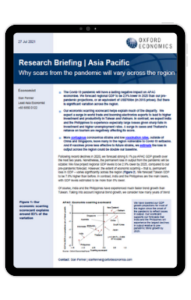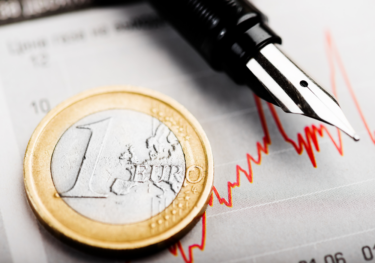APAC | Why scars from the pandemic will vary across the region

Following record declines in 2020, we forecast strong 6.1% pa APAC GDP growth over the next two years. Nonetheless, the permanent loss in output from the pandemic will be sizable: We now project regional GDP levels to be 2.9% lower by 2025, compared to our pre-pandemic forecast. However, the extent of economic scarring – that is, permanent loss in GDP – varies significantly across the region. We forecast Taiwan GDP to be 7.6% higher than before. In contrast, India and the Philippines are the main losers, with GDP levels estimated to be more than 8% lower.
What you will learn from this report:
- The Covid-19 pandemic will have a lasting negative impact on APAC economies. We forecast regional GDP to be 2.9% lower in 2025 than our pre-pandemic projections, or an equivalent of US$700bn (in 2015 prices). But there is significant variation across the region.
- Our economic scarring scorecard helps explain much of the disparity. We expect a surge in world trade and booming electronics exports to lead to higher investment and productivity in Taiwan and Vietnam. In contrast, we expect India and the Philippines to experience especially large losses given sharp falls in investment and higher unemployment rates. A surge in cases and Thailand’s reliance on tourism are negatively affecting its score.
- More contagious coronavirus strains and low vaccination rates, outside of China and Singapore, leave many in the region vulnerable to Covid-19 setbacks. And if vaccines prove less effective to future strains, we estimate the loss in output across the region could be double our baseline.
Tags:
Related Services

Post
Nowcast shows wage growth slowing sharply
Our sentiment data, developed with Penta, suggests that UK private sector wage growth slowed sharply in March and early-April. If official data mirrors our sentiment indicator, it should keep the Monetary Policy Committee on track to cut interest rates in the summer.
Find Out More
Post
The euro and depreciation – shake, shake it off
Our new forecast assumes a slower euro appreciation against the dollar over the coming years than we previously anticipated. Relative productivity, terms of trade, and the current account will likely be less supportive of the euro than we thought. In addition, a stronger stock market than initially envisaged will attract more financial flows into the US than we had expected.
Find Out More